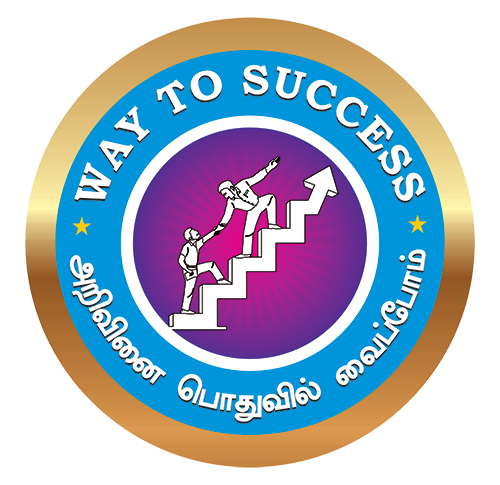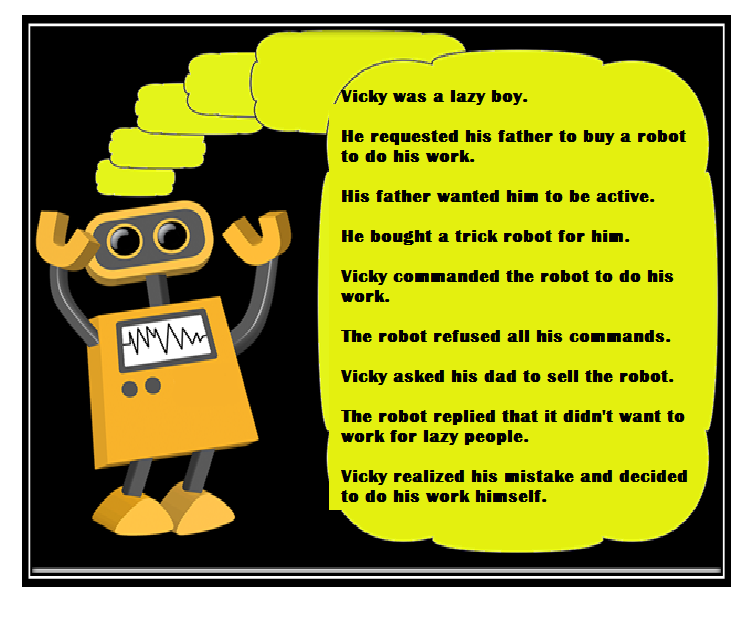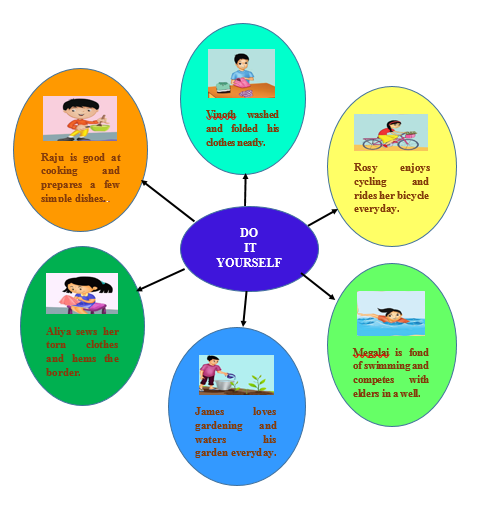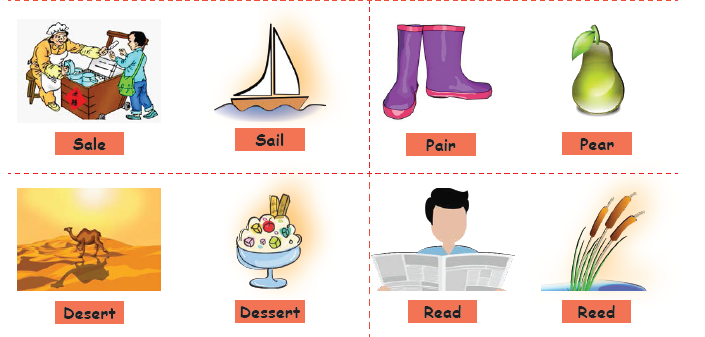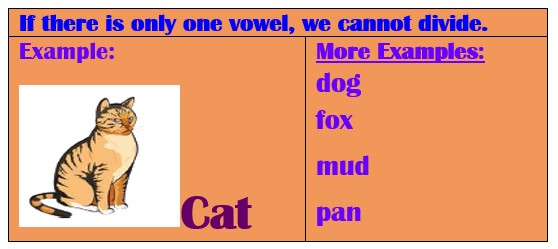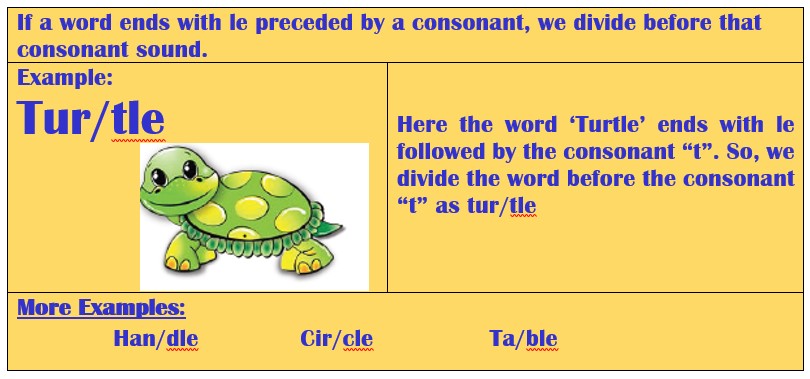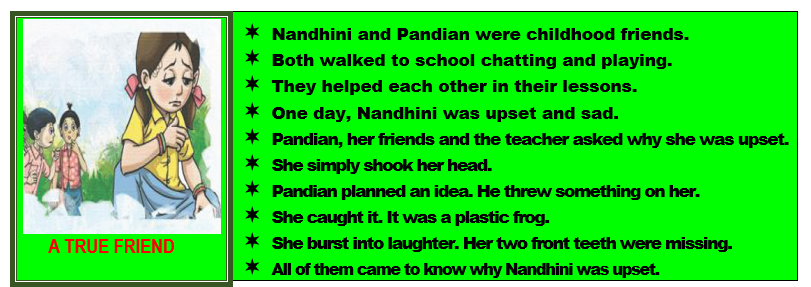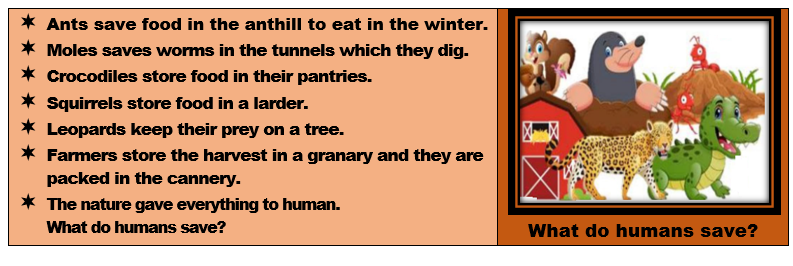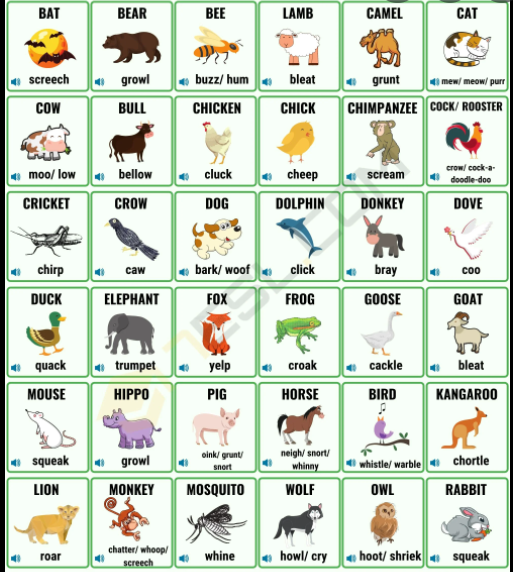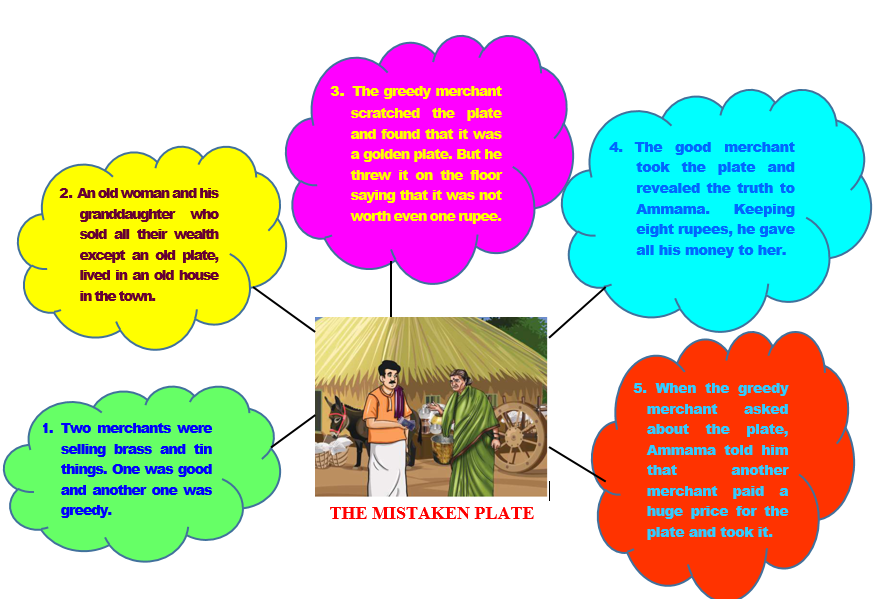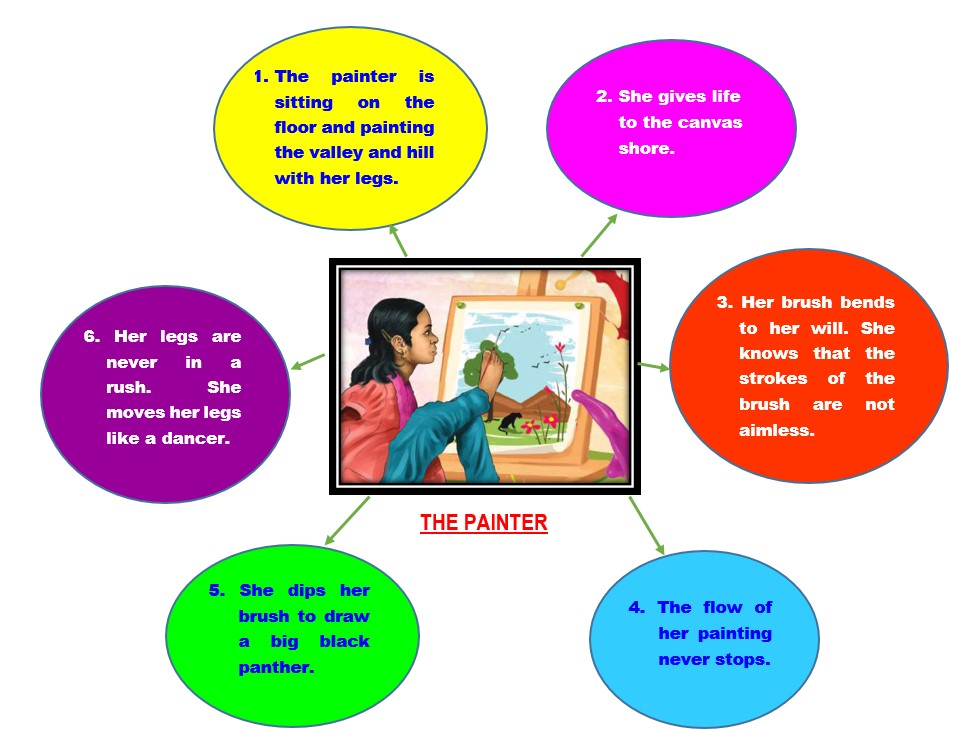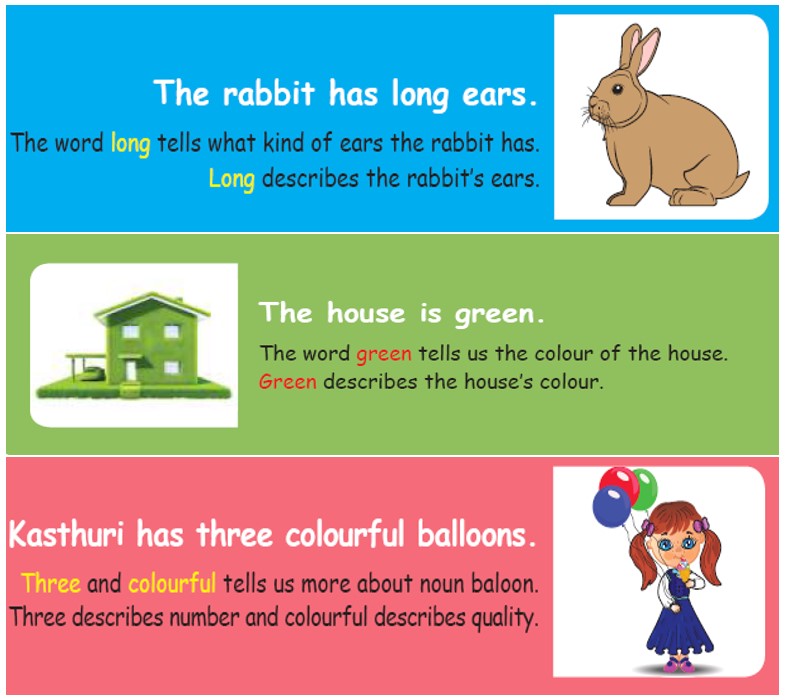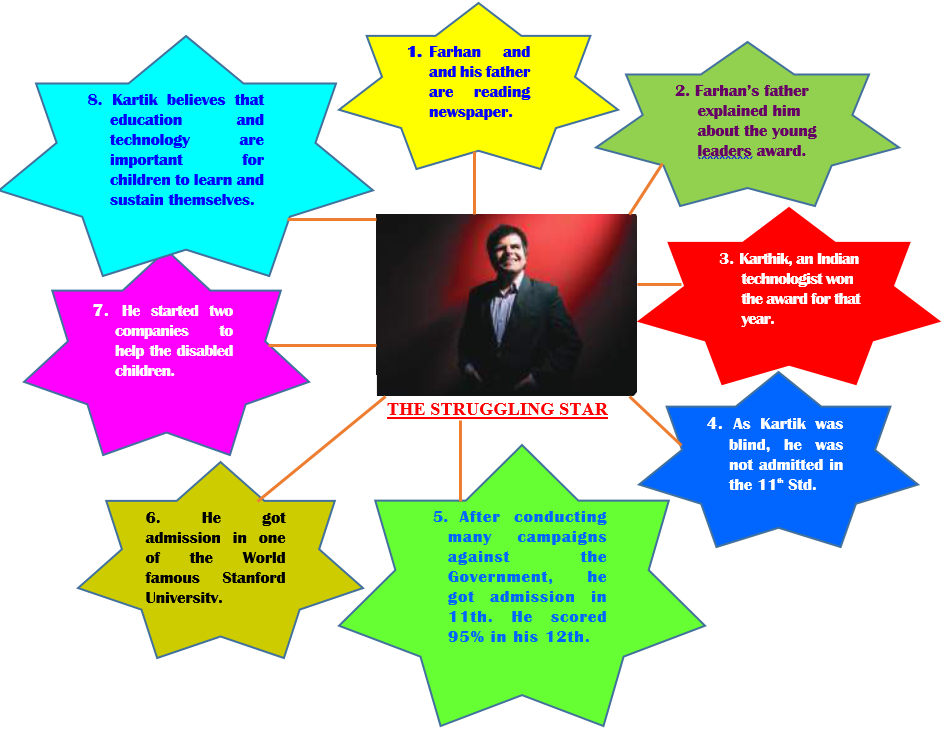Videos
| cruds.institution.fields.id |
|---|
Full View
4th English4th std English book consists 8 units. Each unit contains prose, poem and supplementary sections. - WTS Team |
Full View
TERM-1 UNIT-1 : A World with RobotsProse : “The Trick Robot”, Children read about the life of Vicky who wants a robot to help with his work. Poem : “My Robot”, Children learn about the characteristics of a robot and how it helps its master. Supplementary Reading : “Robot Expo”, Children read about Anitha’s experience at a robot expo. By doing these exercises, they can understand well about “Singular & Plural”. They will also learn about “proper noun” and “common noun”. They can learn to fill up an application form PROSE - THE TRICK ROBOT Vicky was a lazy boy. He never kept his things back in the right place. His father wanted him to be active. As per his request, his father bought a robot to do Vicky’s work. It was a trick robot. When Vicky asked some salad, the robot refused to do so. He asked to clean his room, but it again refused to do so. It again refused when he asked to charge his phone. It asked to charge its battery when he asked for a cup of hot tea. He asked the robot to play a pleasant song. But the robot asked him to do that. He asked his dad to sell the robot. It replied that it didn’t want to work for lazy people. Then, he realized the reason for the robot not obeying his commands. He decided to do all the work himself.
POEM - MY ROBOT The poet has a robot which is big and strong, smart and tall. It walks along with a nice rhyming song. It welcomes all with a nice greeting call. It has wheels which go front and back. It keeps the sack in every little rack. It never takes food and rest. It works its best with all the same zest.
VOCABULARY – SINGULAR & PLURAL
Anitha went to the ‘Robot Expo’. She explained her experience to her friends. She was welcomed by a humanoid (a robot looks like a human). The humanoid told her name and the things she had with her. Her friends told her that it might have scanned her with its eyes. She also found a dancing robot, a butterfly robot, a robot ant and a robot fish too. She also saw a cooking robot that served an omelette to her. She saw another robot that collected and dropped empty water bottles into the dustbin. It advised all of them to use dustbin. Another robot helped her to make a robot that could run. It explained that there were three main parts as the controller that acts as the brain, the mechanical parts that would help the robot to move and the sensors which would help the robot to sense the walls and other things on its way. As per the order she put those three parts together and made a robot herself. She asked her friends to join with her to make more robots. |
Full View
Term - 1 Unit -2 My HobbiesTerm-1 Unit 2 – My Hobbies This Unit talks about “My Hobbies”. Children are fond of learning new skills every day. Their likes can be developed into hobbies. In the prose section “Do it yourself” is a story about Vinoth and his friends’ hobbies. In the poem section “Treasure Trove”, Children learn about how reading as a hobby can help children explore a whole new world. In the supplementary section “Anbu and the fish”, Children learn about Anbu and Madhan’s experience with fishing as a hobby. At the end of the lesson, exercises are given. By doing these exercises, they can understand well about homophones in the Vocabulary section and Simple present tense. They will learn to write a letter to their teacher asking leave for some reason. PROSE – DO IT YOURSELF Vinoth’s parents and other elders did everything for him when he was young. Now, he washes his own clothes and folds them. He loves to do his work as a DIY kid (Do it yourself). Rosy rides a bicycle every day. She learnt to ride a bicycle when she was 9 years old. Megalai is fond of swimming. She swims with elders in a well and competes with them. James loves gardening. He has his own garden and watered it every day. Aliya is always keen to stitch. She sews her torn clothes and hems the border. Raju is good at cooking. He helps by cleaning grains and cereals. He likes slicing, cutting or chopping fruits and vegetables. He prepares a few simple dishes.
POEM : TREASURE TROVE We should read when we are happy or sad. If we want to land on Mars, we would learn about space. We should picture an auto race after zooming with cars. We should go back in time to have a glance at history. We should solve a crime to discover a mystery. To find out the lost bicycle, we should read about it. We can visit a lovely mermaid under the sea when you read about it.
VOCABULARY – HOMOPHONES: The two words that sound the same but their spelling and meaning are different Example:
GRAMMAR – SIMPLE PRESENT TENSE Simple present tense: Present form /present form with ‘s’ / am / is /are. Usage: habitual actions, general truths, unchanging situations, planned actions Example:
Rule 1: Present form Verb / Present from with ‘s’
Rule 2 : Be Verbs
Anbu and Madhan were friends. Every Sunday, they went to catch fish. They used dhoti as a net or fishing rods to catch fish. They collected earthworms and used them as bait. On one Sunday, they caught three little fishes. Anbu was not happy with them. Madhan gave an idea to grow the three fish at home. Anbu filled a jar with water and let the three fish into it. They swam in different directions. When he dropped earthworms into the jar, they did not eat. He saw fear in their eyes. Next morning he found one died fish on the floor. His father bought him a new fish tank. He changed the fish to the new fish tank. The next day also another fish died out of the tank. When Anbu cried, his father consoled him saying that the fish live only in the pond or lake and Nature is their home. He set free the fish in the same lake. From then on, Anbu and Madhan fed the fish with a packet of puffed rice. Feeding fish became their new hobby. |
Full View
Term -1 Unit -3 Time for a JourneyUnit III – Time for a Journey This Unit talks about “Time For A Journey”. Children love to travel and visit new places. In the Prose section “Robinson Crusoe”, Children read a shortened version of the “Robinson Crusoe”. In the poem section, “A voyage” Children enjoys a voyage with animals. In the Supplementary section “Bujju’s Brave Adventure”, Children read about Bujju and his family visiting a nearby hill and how the visit becomes an adventure. At the end of the lesson, exercises are given. By doing these exercises, they can understand well about how to divide a given word and use the connectors (and / but /or) at the right place. PROSE – ROBINSON CRUSOE Robinson Crusoe was a brave young sailor. He loved adventures. When he was 19 years old, his ship started to sink while he was travelling in it. He managed to reach the island by swimming. He was tired and slept on the sand. He travelled around the island and found the broken ship. He made a tent and lived in it. Then he made a small boat. One day he saw a young man who was chased by some tribal men. When he shot twice, the tribal men got scared and ran away. Finally, he saved the young man and named him Friday as he met him on Friday. He taught Friday to speak, shoot and eat like a human. One day, they saved some people from the cannibals. Friday’s father and his friends were among them. One day, Friday and Robinson found a ship. Robinson came to know that the men on the ship had rebelled against the captain. Robinson, Friday and the captain retook the ship after killing the rebels. At last, Robinson sailed from the island to England with Friday, after 28 years, 2 months and 19 days.
POEM – A VOYAGE The horse, the tiger, the ape and the goat decided to hire a boat to find a new country as Columbus had done. The boat went on sailing for a night and a day. All of a sudden a great gale blew there. The horse was trembling. The tiger grew pale. The ape and the goat nearly fainted together. The boat went on sailing and reached a wonderful new country which nobody knew it.
VOCABULARY – DIVIDE THE WORDS Divide the words, to pronounce them easier by the symbol (/). Rule 1:
Rule 2:
Rule 3:
Rule 4:
GRAMMAR – CONNECTORS (AND / BUT / OR) SUPPLEMENTARY: BUJJU’S BRAVE ADVENTURE Bujju’s family set out on a trip to the nearby hill. Bujju’s cousins Appu, Bala, Surya and Janani accompanied him. Bujju’s mother advised them to be around them and not to go anywhere alone. While Bujju’s mother started unpacking the food, the children ran away without informing the parents. When Appu swallowed the guava, he got hiccups. So, Surya and Appu returned to parents. As Bala and Janani felt hungry, they returned to parents. But Bujju was missing his way. He shouted all the other’s name. But he heard only a roaring of a lion. He consoled himself not to afraid. He found the footprints of Appu. Finally, he reached his family and realised his mistake. |
Full View
Term -2 Unit -1 AffectionTerm 2 Unit 1 – AFFECTION This Unit talks about “Affection”. Children share their affection with everyone around them. In the prose section “Appa”, Children can learn about the life of Meena who understands affection in a different light. In the poem section “The real wealth”, Students will learn that love and care is more important than wealth. In the supplementary section “A True PROSE – APPA It was a pleasant Sunday morning in December. Keeraikuppam was a small coastal village near Nagapatinam. Meena’s father went to the sea to catch fish. Meena and her mother were on the shore to see off her father to the sea. Suddenly, there was a big wave that was getting closer to the shore with a roar. Before Meena and her mother reached their home, the powerful wave had hit the village. The seawater entered the village and washed out the huts and the boats. Meena and her mother were separated and thrown off. Meena’s mother gathered herself and searched for Meena. Meena whirled through the water and struggled to breathe. She wrestled with the wave and fainted by hugging a coconut tree. When she woke up, she was in a hospital. After her recovery, she was transferred to a rehabilitation centre which was housed by 99 boys and girls including Meena. Meena was loved by all as she was the youngest of all. The official and his wife were very kind. All children called them Amma and Appa. Meena got well soon. She was then studying in the twelfth standard. She was good at studies. One day her English teacher was teaching in the class. Suddenly, she heard a familiar voice calling her “Meenu”. That was her father. She stared at him for a few seconds and then jumped out of her bench and dashed towards him, calling “Appa”.
POEM – THE REAL WEALTH Parent brings us to the earth. They will never let us spoiled. They earn for our daily food. They wish to see our growth. Brother fights for his share always. But he can’t bear if someone hurts us. We never dare to disobey our sister’s words. She is next to our parents in care. A good friend is with you in all your deeds. Our friend stays last for all our needs. Relationships are the real wealth. We should nurture them like our health. We should show our care and affection with all our zest on them. Our relationships will take care of the rest.
VOCABULARY – PUNCTUATION MARKS Punctuation marks help us to understand the sentences.
GRAMMAR – PREPOSITION OF PLACE The words that tells us the place of the thing or person. Example : in front of, behind, between
SUPPLEMENTARY: A TRUE FRIEND Nandhini and Pandi were good friends since childhood. As they were living in the same street, Pandi would stop at her home every day. Both would walk to school chatting and playing. They always took part in school activities together. They helped each other in their lessons. One day Nandhini looked upset and sad. When Pandi, her friends and the class teacher asked her the reason for her sadness, she simply shook her head. Pandi planned an idea to make her smile. He took out something from his bag and ran to show it to her. He tumbled and it slipped from his hands. It was flying straight to Nandhini. Nandhini screamed with fear when she saw something flying towards her. She caught it. It was a big green frog. Everyone ran away as they were scared of the frog. It was a rubber frog. Nandhini burst into laughter. Her two front teeth were missing. The teacher and her friends came to know Why Nandhini did not smile or talk to anyone all day.
|
Full View
Term -2 Unit -2 SavingsTerm 2 Unit 2 – Savings This Unit talks about “Savings”. Children should learn to save so that it can be developed into a habit. In the Prose Section “A lesson to save”, children will learn to save the natural resources. In the Poem Section “What do humans save?”, Children will raise questions on the importance of saving. In the Supplementary Section “Save Wisely”, Children will read about some children who meet their needs by their savings. At the end of the lesson exercises are given. By doing these exercises, they can understand well about Prefix and Simple Past Tense and Simple Future tense. They will also learn about to fill up the Savings Account challan and a withdrawal form at the post office. PROSE – A LESSON TO SAVE Amir saw a mole rat near a pit on the way to the playground. When he asked what it was doing, it replied that it was digging a burrow to catch earthworms and saved them for the winter. Amir saw a leaf cutter ant which was carrying a big leaf. When he asked about it, it replied that it was collecting leaves for its colony and it could carry leaves that weighed nearly twenty times its weight. The ants didn’t eat leaves. They only drink the juice of the leaves. They used the leaves to grow fungus to feed their babies. They also stored the leaves for the winter. When the ant asked if the humans saved the food that they needed, Amir answered that humans saved the money only. Other than money, his mother asked him to save water, food, electricity, forest and fuel which the future generations could use. The interaction with the mole and the ant changed Amir’s thoughts about the things around him. Then, he saved and cared the resources around him. POEM – WHAT DO HUMANS SAVE? Ants pile their food in the anthill and eat it during the winter. Moles dig tunnels and save worms in them. Crocodiles that are found in many countries, store food in their pantries. Squirrels store a seven course meal with starter in a larder. Leopards keep their prey on a tree and eat them when they are free. Farmers store the harvest in a granary. The harvest will soon be packed in the cannery. The poet raises the question what we save from the nature that has given everything.
VOCABULARY – PREFIX (Un-, Re-, Dis-, Pre-) Prefix: A combination of words is fixed at the beginning of the word. Example: GRAMMAR – SIMPLE PAST & SIMPLE FUTURE SUPPLEMENTARY – SAVE WISELY Every year, Kamali and her cousins would visit their grandparents in their native village for the car festival. The family members and relatives would give the children money to buy sweets and toys. The grandfather felt that the children should learn to save the money. He made an announcement that the children should use their money wisely. Rajan and Mala did not take the words of the grandfather and spent their money. Jayan and Kavery enjoyed the street food. As Jayan got sick due to food poisoning, he decided to spend the money only on toys. Kamali and Senthil controlled their desires and saved every rupee they got. Senthil saved all his pocket money in a post office account without using even for his basic needs. His father made him understand that savings is done after using the money for basic needs. Senthil’s dream was to buy a new camera and his father bought him the latest camera with his savings at the end of the year. Kamali wanted to buy a flute. So, she saved some money for that. As her father needed money urgently, Kamali gave her savings to him. After one year, the whole family gathered in the village for the car festival. After dinner, Senthil showed his new camera to his grandpa and told him how he bought it with his savings. Meanwhile, Kamali’s father gave grandpa a gift by saying something in his ears. Grandpa gave Kamali the gift which was bought with her savings. At the end, Kamali played the flute and Senthil started clicking pictures of the event with his camera. |
Full View
Term 3 - Unit 1 – The Best PolicyThis Unit talks about “The best policy”. Children should learn the values that affect their attitudes during this age. It is important for them to build the right attitude. This lesson focuses on the importance of honesty. In the prose section “The seven seeds”, Children will learn about the importance of honesty and integrity. In the poem section “Be honest”, Children are insisted to be honest at all times. In the supplementary section “The mistaken plate” Children will learn about the loss of an greedy and dishonest merchant. At the end of the lesson exercises are given. By doing these exercises, they can understand well about the sounds of the animals and Articles. PROSE – THE SEVEN SEEDS Long ago, there was a kingdom at the foothills of Anaimalai. The kingdom was ruled by an aging king for thirty years. As the king has no heir, he wanted to adopt an honest child. He held a competition to find out his heir. At the end of it, five boys and five girls were selected for the last round. The king gave seven seeds of wheat to them and asked to grow for six weeks at their home. The person who nurtured the best will be the heir to my throne. One of the finalists was Ani. The seeds she had got, failed to sprout. She had selected the right soil, the right manure and dutifully watered it. Her friends advised her to buy new seeds and plant. But her parents advised her that it would be wrong to cheat the king. Ani agreed to their words. After six weeks, all the finalists (except Ani) had great success with their seeds. The king came and looking at the children’s pots. Finally, the king asked Ani what she had done with the seeds that he had given to her. Ani replied that they failed to sprout. The king announced that she was his heir. He explained the crowd that it was a test of character, a test of honesty. Only that girl passed the test. He had given boiled seeds to the children which could not grow. MIND MAP:
POEM – BE HONEST The poet’s mother will often say to him to be honest all day. Even though problems make him fall, he wants to be truthful to all. We have to say the truth when he is wrong, even though he may have to be eighteen. His mom says that many may lie and go, but honesty will help us to grow. At last, he doesn’t lie to this day. The trick is the rhyme. If we try that one day at a time, we’ll be honest everyday. MIND MAP:
VOCABULARY – ANIMALS AND THEIR SOUNDS
GRAMMAR – ARTICLES (A, AN, THE) SUPPLEMENTARY – THE MISTAKEN PLATE Once upon a time, there lived two merchants who sold things made of brass and tin. One was good and generous. The second one was greedy. They divided the streets of a town without disturbing each other while selling. An old woman and her granddaughter lived in an old house in the town. They had only one plate left as a memory of their wealth. When the greedy merchant passed the house, the granddaughter asked her grandma to buy something for her by selling that memorable plate. The greedy man scratched the plate and found that it was an old gold plate. But he said that it was not worth even one rupee and threw it on the ground. When the first merchant passed the same old house, the granddaughter asked her grandma to sell the plate and buy something for her. The good merchant took the plate and found that it was a gold plate. He revealed the truth about the plate and told the grandma that they could take all the dishes they wanted by selling the gold plate. He gave all his money (keeping eight rupees with him for the ferry home), his donkey, his cart and his wares to Ammama. He crossed the river by paying eight rupees to the boatman. The greedy merchant soon went back to the old house and told them that he would give her ten rupees for the gold plate. But Ammama replied that another merchant had paid a huge price for that plate (which he considered a worthless one) and took it.
|
Full View
Term - 3 - Unit 2 – Creativity around meTerm - 3 Unit 2 – Creativity around me This unit talks about “Creativity Around Us.” Children are very eager to know about different forms of art. They like to learn them. In the prose section “Bala Spins Magic”, Children will focus on the traditional art of weaving. In the poem section “The Painter”, Students will come to know how passion has no boundaries. In the supplementary section “The Wooden Toy”, Children will know through the story of the boy Mugunth who used his art to save his family. At the end of the lesson exercises are given. By doing these exercises, they can understand well about the British English words and the American English words. They will also learn about Adjectives. They can even write a small paragraph about a given topic. PROSE – BALA SPINS MAGIC Bala and his family lived in a tiled roof house at Periya Negamam village near Pollachi. He went to school. He always wanted to know more about their family profession -“weaving”. Bala, his mother, sisters and cousins helped his father to weave the lengths he needed. Appa and Amma weaved bundles of cotton into beautiful sarees with checks or patterns. Bala would help to roll, press and pack the sarees. One day, Bala was going with Appa to Chennai to help him carry the sarees. They left in a train to Chennai. After reaching Chennai, they went to Purasaiwalkam. The next morning, Appa was ready with places to sell sarees. Soon, they reached a big house and sat in a big hall to unpack the sarees. When Appa showed the sarees, Nithin (the boy of the house) came and asked Bala to play with him. Bala did not know to play with all the electrical controlled toys. He saw a spinning wheel in one corner. He taught Nithin how to spin the wheel with the cotton fluff. Nithin struggled but soon learnt to spin. He told his mom that Bala had taught him magic. His mom laughed and said that his father was a weaving magician too. Nithin said that he would tell his friends that a magician from Periya Negamam taught him that magic. MIND MAP:
POEM – THE PAINTER She is sitting on the floor and painting the valley and hill. She gives life to the canvas shore and sees the brush which bends to her will. Her canvas is used to be colourless, until she learnt that the strokes of her brush are not aimless. The flow of her painting never stops. She dips her brush to draw the big black panther. Her legs are never in a rush. She moves her legs like a dancer. MIND MAP:
VOCABULARY: Some words are used to indicate same thing. Example:
GRAMMAR: ADJECTIVES: Words that describe noun are called Adjectives. The adjectives give more details about the noun’s size, shape, colour and count. Examples:
SUPPLEMENTARY – THE WOODEN TOY Mugund and his father lived in a village which was circled by mountains and many big trees. Many wild animals in the forest used to hunt the animals in the village. Mugund used to make dolls using the dry wood called marapachi bommai. Long ago, the wild animals hunted Mugund’s mother. In memory of his mother, he carved a wooden statue of his mother and prayed every day. One night, he heard his mother’s voice -“eradicate the use of plastic through your art.” In the beginning, he made dolls for children, using dry wood. Then he was making statues of any photo that shown to him. His father took all the cattle to pasture every day. One day, his father saw that some animals were missing when he counted after returning home. Mugund made a wooden drum to drive out the wild animals. When the sounds of the drum stopped, the wild animals started to attack. Then Mugund made some wooden tigers and wooden people to place on the farm. The wild animals were afraid of them. Soon Mugund started selling wooden toys to all corners of the land. Mugund was happy that he was able to take part in saving the world through his art. MIND MAP:
|
Full View
Term 3 - Unit 3 - Secret Of SuccessTERM 3 UNIT 3 – SECRET OF SUCCESS This unit talks about “Secret of Success.” Children are fond of learning about this topic. Children should build the skill to fight and succeed challenges. In the prose section “Struggling Star”, Children will learn about the story of Karthik and his struggles for education. In the poem section “Never give up”, Children will learn about that one should never give up their efforts until the goat is achieved. In the Supplementary section “The Magic Pencil”, Children will learn about Chris and how his consistant practice helped him to build a skill. At the end of the lesson exercises are given. By doing these exercises, they can understand well about Masculine and Feminine Gender in the Vocabulary Section, Present Continuous Tense in the Grammar section. PROSE – THE STRUGGLING STAR Farhan and his father are reading the morning newspaper. His father explained him about the young leaders award When Farhan raised about it. The award is given to 17 people around the World every year for the effort they have taken to make the world a better place. That year, Kartik has got this award. He is an Indian technologist who had not let his disability (he is a blind boy) stop him from learning. The Delhi government did not allow blind children to study science after 10th standard. But Kartik thought that it was unfair. He challenged the government and held campaigns to get permission. After nine months, the government permitted the blind students to study Science if they want. Kartik got 95% in his 12th board exam. He wanted to study in the IIT. But, none of the sixteen IIT’s enrolled him. He got admission to study at Stanford University in the USA which is one of the best colleges in the world. He started two companies that aim at helping children with disabilities. He believes that education and technology are important to ensure children learn and sustain themselves. His father advised Farhan that sometimes, the support to achieve one’s dream comes from outside. But, many times it comes from within us. So, one should work hard to achieve their dreams. MIND MAP:
POEM – NEVER GIVE UP If the fisherman draws his net soon, he won’t have any fish to earn. If the child shuts up his / her ears soon, he /she won’t have to chance to learn. If one tackles the huddles to resist, he may win the world at the end. When you are slow, you don’t feel down. You should keep moving and let your life glow. We have to put our effort continuously at work or play. We should never give up all day. MIND MAP:
VOCABULARY: MASCULINE AND FEMININE NOUNS (GENDER) Gender of a noun indicates whether a person or animal is male or female.
GRAMMAR: PRESENT CONTINUOUS TENSE To describe the actions that are happening at moment of speaking or unfinished actions. SUPPLEMENTARY – THE MAGIC PENCIL Chris was a school going boy. His artwork was never a happy ending. He would give up quickly. One day his drawing began to speak to him. The drawing told him to rub it and try again to draw better. The drawing started to teach Chris until he drew him well. The circle would not stop saying to draw some hair, so that it looked like a lollipop. After spending the whole afternoon, Chris could draw the little figure much better than his classmates. Chris thanked his new teacher for that. His new teacher replied that he didn’t do anything. It is the result of Chris’s long practice. The next morning, Chris found no pencil and a blank paper (on which he had drawn the little figure yesterday). He got confused. Then he tried to draw a little man with a pencil and paper. He adjusted a couple of rough lines. He realized the truth. If one wants to learn to do things, he/she only needed to keep trying and to enjoy while doing so. Chris imagined that his drawing would tell him to draw a bit better and he couldn’t go out looking like that.
|
| Recent Question Papers & Keys |
|---|
